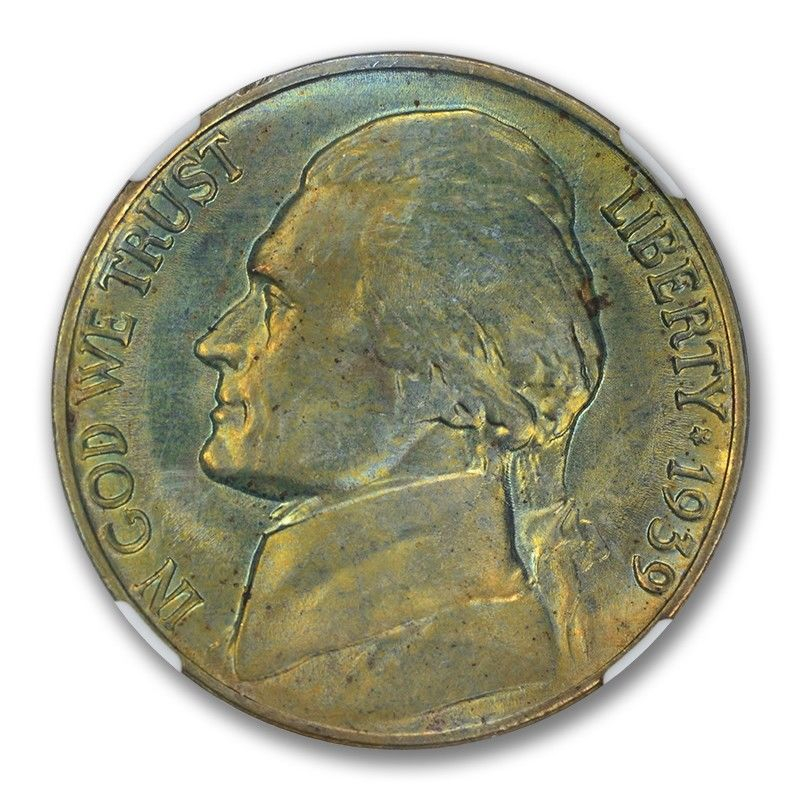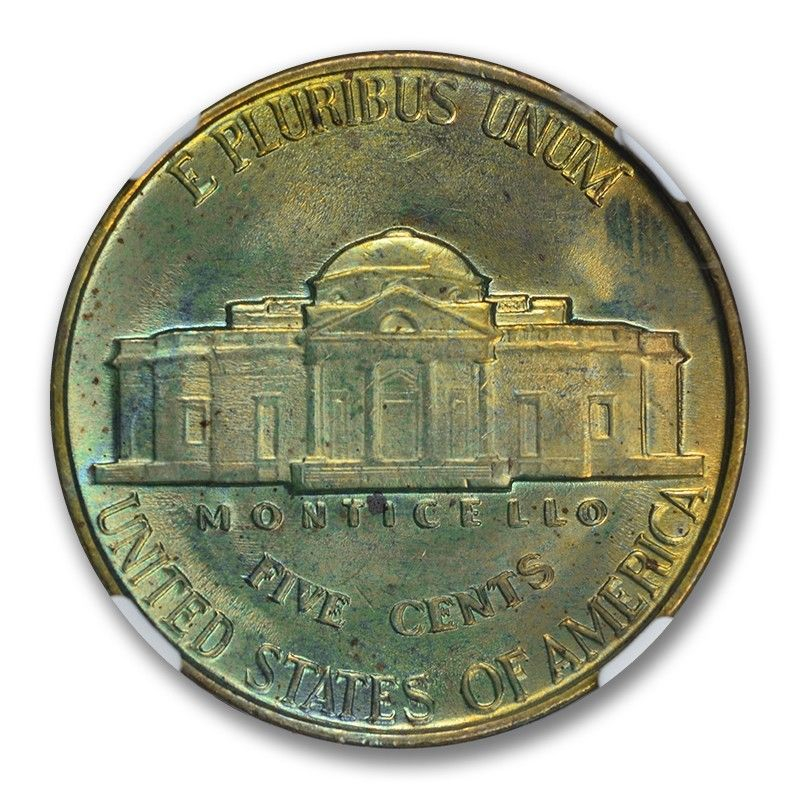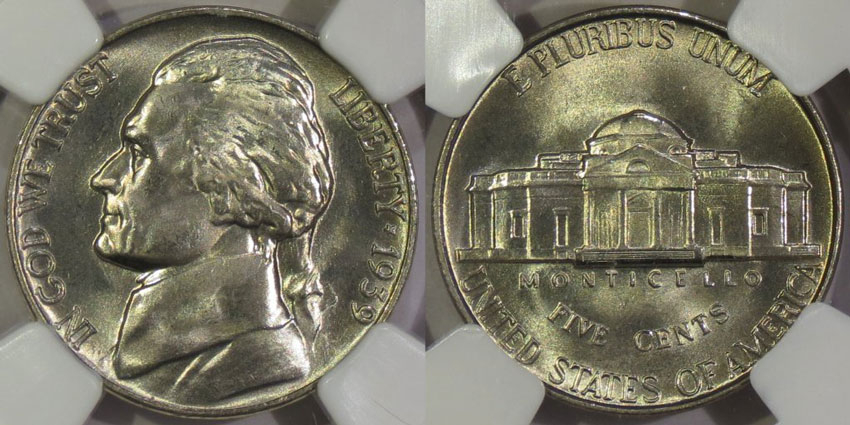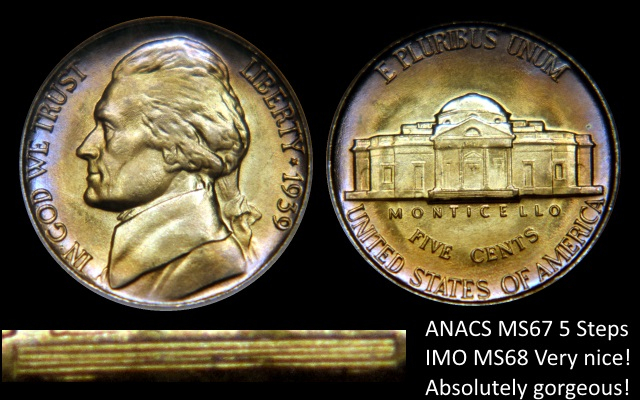eBay Listing: 1939 MS66FS DDR FS-801, You've got to be kidding!
This is a perfect example of a TPGC not getting the full step designation right! I would not have started this post if the steps looked close, or if this was not one of the most popular variety of the series. Population Reports and Price Guides get so distorted with the inclusion of coins like this. This coin is an MS66FS DDR FS-801, so let's break it down:
GRADE - MS66
I'm a little torn on this grade primarily due to the spotting. Some of the spots may be impacting the actual surface of the coin, especially the one under the steps. I'm not a fan of original surfaces being impacted by some form of contaminant. The toning may be natural, but there is just something about it that makes me say hummmm. Though this is a 1939 DDR, which usually has noticeable "orange peel" effect on the surfaces, but this one it is not as prominent. It is well struck and has pretty clean, mark free surfaces and devices, especially the face, hair and coat. I personally would lean more toward an MS65 grade due to the spotting.
FULL STEPS
I don't have the coin 'in-hand', but have to say I can't even stretch my imagination far enough to put an FS designation on this one. There is no indication that the bottom 2 or 3 lines are even close to being there. The details on the rest of the coin appear decent, so why would the step lines not be a little more apparent? That hit between the third and forth pillar looks pretty deep and probably cuts that bottom line, if it is even there. Not much more I can say, except not a full stepper.
CONCLUSION
Best this should be is an MS66 example of the Jefferson Nickel variety. I would give it an MS65 non-FS!
The eBay listing number is 263335573126. It is also being listed by a seller with 29 transactions! Could this be a fake holder? What are your thoughts?


Comments
I doubt it's a fake holder...would seem a weird coin to choose to do that.
Likely got a color bump and possibly the spotting isn't horrible when the coin is viewed with little or no magnification.
As far as the FS designation, if I submitted it I would not be hoping for a FS, but then again, even though I have been involved in Jeffersons for many years, I never quite understood the focus on the steps.
I will not comment, as much as I'd like to.
Me thinks that coin took a turn for the worse after it was holdered.
I always liked that doubling.
Pete
Their 1957-D in PCGS MS66+ FS does not look so hot either
I can not tell if they are just pushing labels or if some fraud involved...
IMO...The 1939 double Moticello does not look to me to be fake. I'm not sure it could be called 5 steps, but then again in today's world...who knows.
I wish we were able to raise these concerns with TPGCs to review coins with potential attribution errors without having to own it!
Self Edit at OP's request.
I hope I conveyed the message that anyone can find examples of over graded, under graded, and correctly graded coins in TPGS slabs.
The NGC Cert Number is legit, but there are no images...I thought that NGC imaged all of their coins, especially newer ones (four prong holder)? I like the variety and color, but definitely not the Step designation.
https://www.ngccoin.com/certlookup/4227578-017/66/
BST transactions: dbldie55, jayPem, 78saen, UltraHighRelief, nibanny, liefgold, FallGuy, lkeigwin, mbogoman, Sandman70gt, keets, joeykoins, ianrussell (@GC), EagleEye, ThePennyLady, GRANDAM, Ilikecolor, Gluggo, okiedude, Voyageur, LJenkins11, fastfreddie, ms70, pursuitofliberty, ZoidMeister,Coin Finder, GotTheBug, edwardjulio, Coinnmore, Nickpatton, Namvet69,...
Insider2, point taken and agree. Thanks
Now let's post about the two coins and what they possibly should have been graded. Over a hundred folks took a look at this discussion already and it is a good one!
The spotting kills it............if it will still grade.
Don't like the color much either.
MS-64 is pushing it.
Pete
I wonder too about when they occurred. I have an air hose for my tires at home that emits a fog when I use it.
I have a suspicion that some spots on coins may be caused over a long time due to some moisture in the TPGS air hoses. The compressors have moisture traps but they must be maintained properly. Who knows? I'm just paranoid and afraid of my own shadow. LOL.
Tonight, I'm going to blow-off a silver proof as a test.
FS= Flat Steps?
BHNC #203
The "steps" on that Nickel look more like a slide to me. And the spots are really bad.
This was a 'gift' from the graders as far as the step count goes, just don't see where the bottom two steps come into play. As I've know for a long time, this company is more stringent when it comes to step count so either the image is misleading or they are simply just not there. The spotting I've seen before and I attribute some of the splotches due to alloy mixture impurities and just pop up under the right conditions. The DDR is really nice and it's nice to see such a nice example.
"Keep your malarkey filter in good operating order" -Walter Breen
@WoodenJefferson said: "The spotting I've seen before and I attribute some of the splotches due to alloy mixture impurities and just pop up under the right conditions."
I'll need to disagree 100% with this statement about this being the cause of the spots. Magnify the image and you'll be able to see the impurities in the center of many spots (especially the large one). Therefore in this case it is not moisture from an air hose as I suggested may be the cause.
The spots are on both sides of the Jefferson, so impurities in the metal, be it copper impurities or something else is purely speculative, could be 'spittle' for all we know from a sneeze or drooling...I've seen these spots on 38's-39's.
"Keep your malarkey filter in good operating order" -Walter Breen
At first gave you an agree but removed it. Debris in the center of oxidation is just that. Something was ON THE TOP SURFACE of the coin. Some of it could be spit droplets as you said.
How important is the arches when comparing to split steps? Plus the blues and green patina adds to the appeal and price and therefor the grade.
A compressor is only one way to get air. You could also use bottled air which has zero water in it or, more commonly, nitrogen blow off from liquid nitrogen that has zero water in it. That's what chemistry labs tend to use. I'm not sure what TPGS use
All comments reflect the opinion of the author, even when irrefutably accurate.
the spots are either carbon spotting from a foreign substance or the result of the planchet being struck by a rusted die. they are especially noticeable on coins from 1940-41, I have seen some nice Proofs with more than this coin. more than likely it is just a bad alloy mix with iron or something similar.
I do not see full steps there... and I do see the hits on the steps... cannot understand the FS designation in this case. The spots make the coin look trashy.... Cheers, RickO
I wouldn't want to climb those steps. Well, I guess that maintenance people that keep things in order have been affected by the Government Shutdown.
Pete
@jmlanzaf said: "A compressor is only one way to get air. You could also use bottled air which has zero water in it or, more commonly, nitrogen blow off from liquid nitrogen that has zero water in it. That's what chemistry labs tend to use. I'm not sure what TPGS use."
Over the years, I've toured or been inside the assembly line at three TPGS. They each used compressed air to blow off the coins and cases. Perhaps they should look into nitrogen.
BTW. the guys who assemble coins are like robots. They really crank things out, especially if an order consists of coins the same size. My guess is at least five to six slabs per minute. They do not seal the case, it is done by someone else.
@keets said: "the spots are either carbon spotting from a foreign substance or the result of the planchet being struck by a rusted die. they are especially noticeable on coins from 1940-41, I have seen some nice Proofs with more than this coin. more than likely it is just a bad alloy mix with iron or something similar.
I disagree 100% with much of this due to (EDIT)... Let's just say I've examined a few nickels very closely. IMO, MOST of the spots result from either debris or outside contamination (spit, etc). A bad alloy mix looks different on the surface. The "Flyspecks" commonly seen occur in a crystalline pattern an lay on the surface. If removed they leave an etched pattern. IMO. 99.9% of the roundish spots on nickels are the result of a droplet or a "reaction ring" around surface contamination. The "spot" between the "T" and "I" is a perfect example.
IMO, the color of this coin merited the grade - then it spotted.
wow, what a surprise, my serial stalker disagrees with something I posted.
Would it effect the actual striking of the steps with it be a DDR? Looking at them surely does not look to qualify as FS, but wondering if the DDR would have effected the striking and it was given due to that?.
My Original Song Written to my late wife-"Plus other original music by me"
https://youtube.com/playlist?list=PL8A11CC8CC6093D80
https://n1m.com/bobbysmith1
The speckled black spots look they are over the toning and not under it. The theory it was graded before serious spotting rings factually true.
@keets Here is a clue: I don't stalk anyone on CU. In fact, I look forward to your posts and consider you a very informed guy. I edited out the reasons you may wish to take my opinion about the OP's coin seriously as they don't belong here. We are all equals, right?
That said, know this for a fact: I'm an equal opportunity ("stalker?") poster. There is enough uninformed BS posted on coin boards to drive a person crazy. Please don't claim that I am calling you ignorant because I disagree with some of your comments. Hopefully, the opinions I post are helpful. I will not be around much longer and never got around to writing that book I started in 1978. BTW, it is not titled: "How to win collector friends and influence numismatists."
If I disagree with something, I rarely give "one" (as I did once to you in the past for pissing me off ). Rather, than doing as you have done before by just pressing the "disagree" button, I give a reason as I have to two of your comments above. Stay Sweet and don't worry as I don't bite.
). Rather, than doing as you have done before by just pressing the "disagree" button, I give a reason as I have to two of your comments above. Stay Sweet and don't worry as I don't bite. 
PS I know of only one "stalker" on CU at the moment and he stalks me and another member just to disagree w/o comment. My feeling is that when you are a sorry old man who cannot add anything of substance - just disagree. I laugh at his actions.
PPS I hope he reads this.
bsshog40, interesting question concerning the doubled die and the implications to step strike/details. We know there is at least one super full stepper for this variety, so we know the doubled die should not give a TPGC a reason to over look step details to award a coin the FS designation. My. MS66FS+ example is shown below.
I have looked at their PCGS Jefferson and associated truviews - they use so much light that many details get drowned out. It would not surprise me if they actually were full steppers.
Now mine isn't a DDR but it is a 1939 Rev of 40 MS66 w/5FS.


My Original Song Written to my late wife-"Plus other original music by me"
https://youtube.com/playlist?list=PL8A11CC8CC6093D80
https://n1m.com/bobbysmith1
Nice!
Are we posting nice 39's now, here's mine. Nice one above me, BTW.

Leo
The more qualities observed in a coin, the more desirable that coin becomes!
My Jefferson Nickel Collection
Leo, I think the thread is about the DDR's and while your coin is nice it doesn't look like that variety.
STALKING...?
I would not have been as gracious as you were Mr. Keets.
Al......thank you! I really don't have anything more to add since much has already been said about the steps, strike and spots providing the pictures are adequate. Little has been said about the DDR. Perhaps you can expand on that for us? I'm only providing an excellent example of a high quality 1939, just like bsshog40 has.
Cheers, Leo
The more qualities observed in a coin, the more desirable that coin becomes!
My Jefferson Nickel Collection